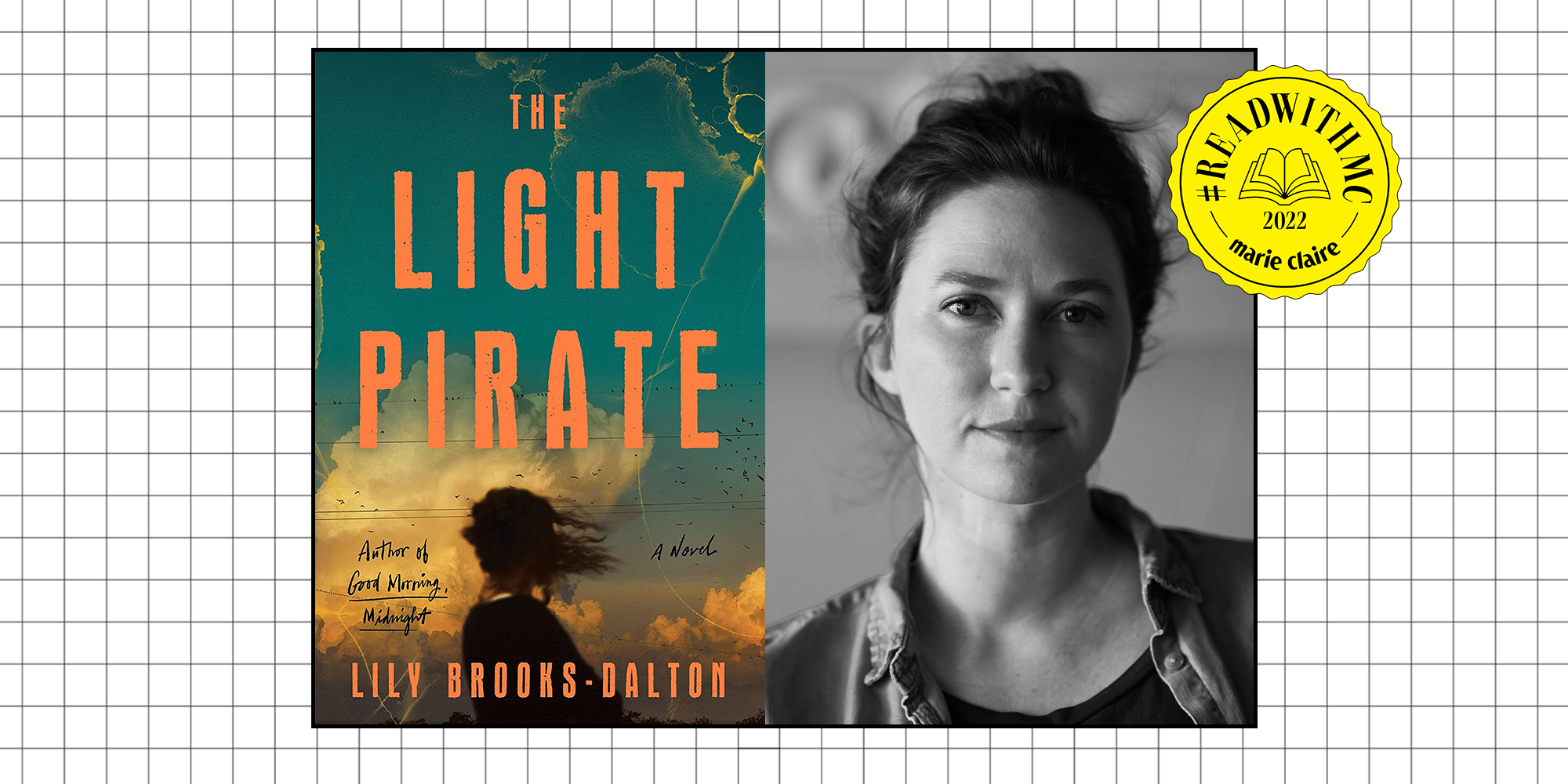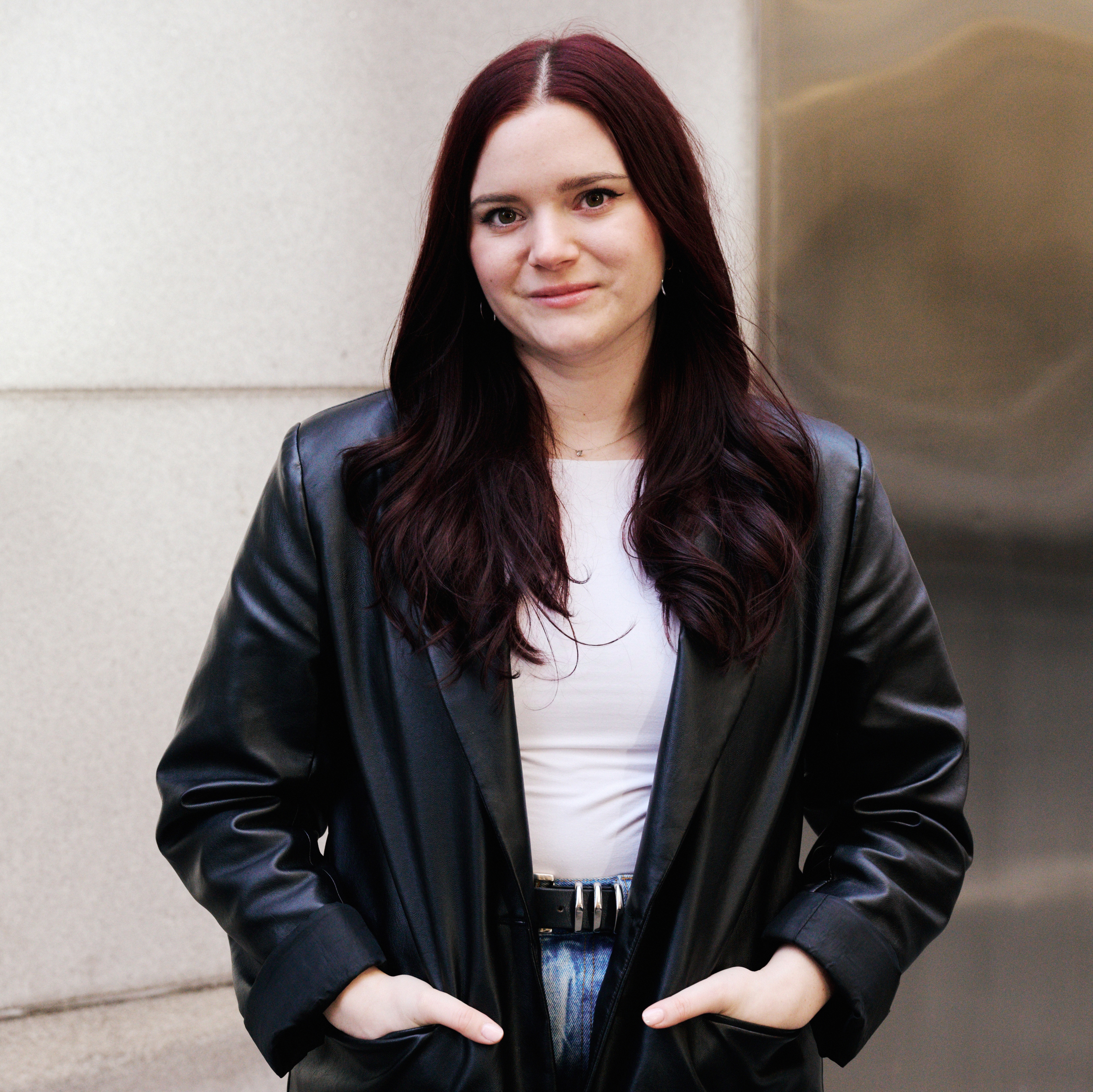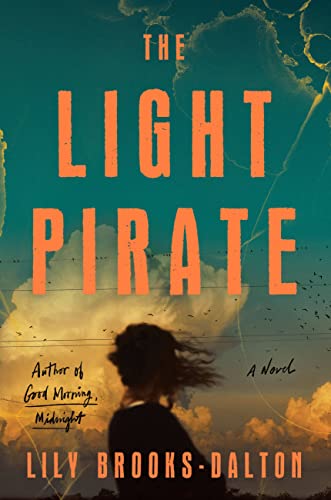'The Light Pirate' Is Our December Book Club Pick
Read an exclusive excerpt from Lily Brooks-Dalton's latest novel, here, then dive in with us throughout the month.


Welcome to #ReadWithMC—Marie Claire's virtual book club. It's nice to have you! In December, we're reading Lily Brooks-Dalton's The Light Pirate, a sweeping, illuminating novel about climate change, family, and survival. Read an excerpt from the book below, then find out how to participate. (You really don't have to leave your couch!)
The rain starts as Frida scoops the cold, congealing mashed potatoes into Tupperware. There is too much food left over—Lucas and Flip were being fussy and she wasn’t thinking about how long they might have to go without power when she decided to buy a whole chicken. She wonders if she should just throw the mashed potatoes away, but at that moment it seems like more work than to save them, so she clicks the lid into place and stacks the container in the fridge with all the other Tupperwares, little cloudy boxes with their rainbow of contents. It might be beautiful if she didn’t know what was inside them all—fried plantains gone soggy; pink beans and rice; roasted carrots; overcooked chicken. But she does, and so all she sees is a constellation of food that no one wanted the first time. The recipes she knows by heart they hate, and the recipes she learns for them seem to go wrong. She always enjoyed cooking, but Kirby is useless in the kitchen and somehow the task of feeding them all has fallen to her. She likes cooking less now. She misses the grind of Houston—at least there she knew what she was working toward, and the only person she had to take care of was herself.
The boys are in bed and Kirby putters out in his tool shed. The quiet thrum of rain against the roof usually makes her feel peaceful, but tonight it sounds like a threat, soft and persistent—ready to intensify at any moment. Kirby comes in with his hand-crank radio, stepping over the sandbags in the doorway and spattering water across the floor. Rain pools at his feet. Frida doesn’t want to fight with him, but he is so calm it feels like she must. If she doesn’t remind him how vulnerable they all are, she worries he will forget. His comment to Lucas is still ringing in her ears. A little rain. A little wind. Goddammit, Kirby, she thinks.
“See?” she says, gesturing at the ceiling and the sky above it. On another day she might have held back. She might have seen the exhaustion on his face and remembered that he is also doing his best. But it’s not another day. It’s today, and today she is tired of feeling alone with the panic that lately seems like it is always whirling just beneath her skin. “It’s starting and the windows aren’t boarded up yet. Are you even listening?”
“For fuck’s sake.” Kirby slams his hands into the back of one of the chairs, pushed in neatly, and the entire table jumps forward a few inches. “I’m boarding them up first thing. I told you we’d be ready and we’ll be ready. You think I haven’t been tracking it? You think I don’t know how hurricanes work? It’ll hit farther north. And even if it doesn’t, we’ll be fine.”
“Right, because you know everything, Kirb. You have all the information. I’m the one who doesn’t know shit.”
Except they both know, firsthand, how hurricane season goes. For years, Kirby made his living taking storm-duty contracts, traveling to wherever the aftermath was worst, and for her entire childhood, Frida and Joy were ruled by weather patterns. None of that helped her in San Juan. Is it any wonder she’s so frightened now? The most significant moment of Frida’s life is wrapped in the howl of a hurricane, the dark funnel of grief and a bright pinpoint of the eye shining above—the brightness that used to be Kirby. It used to be this house, and the life they were building inside it. Now, it’s not that she doubts her husband’s expertise in these storms, but rather that she doubts his expertise in her.
Get exclusive access to fashion and beauty trends, hot-off-the-press celebrity news, and more.
“Fri,” he says, trying to de-escalate the fury he sees on her face, “we’ll be okay. I promise. I’ve been prepping for hurricanes since I was a kid. I know how to do this.”
He reaches for her. The baby kicks again, hard, and she suddenly doesn’t have the energy to point out that they have this in common. That there is not one expert in this house but two. Soon, a third. Because what will this baby know but storm after storm?
Tears come, falling along with the rain outside—warm and steady, not yet thunderous. The prelude to something greater. Something torrential. She lets him hold her, both of them standing in the rainwater seeping from Kirby’s boots.
“I’m scared,” she whispers.
“Don’t be,” he says, and it makes everything so much worse.
~ ~
The power goes out in the middle of the night. It’s the kind of thing that most people sleep through, but Kirby is not most people. He is immediately awake, aware of the various degrees of silence where there was once a humming refrigerator, the tick of a wall clock, a purring fan, the quiet groan of the central air vent. The constant buzz of electricity waiting to be dispersed. It all clicks off in the same second, and Kirby hears it as if it were a sonic boom.
He rises quietly. In the bathroom, he notices the outline of a philodendron silhouetted against the bathroom window. It waves to him, a dark flutter of its enormous leaves. The winds are picking up. For a moment, he worries that he’s left boarding up the windows too late. It could be the storm moved more quickly than folks realized. Could be that Frida was right. Is it already here? An uncharacteristic pang of doubt shatters any sleep that still clung to him.
"The most significant moment of Frida’s life is wrapped in the howl of a hurricane, the dark funnel of grief and a bright pinpoint of the eye shining above—the brightness that used to be Kirby."
He dresses quickly, his Carhartts in a heap on the bathroom floor where he left them, the same stinking T-shirt he wore the previous day, still damp with sweat. The house is beginning to warm without the AC. He goes outside and fishes his headlamp out of the glove box of his truck. Putting it on, he’s glad the plywood is already sorted, relieved that the wind, stiff and uneven, is not yet dangerous. There’s a lull in the rain and he hurries to make the most of it. Frida thinks he isn’t taking the forecast seriously, but he is too good at his job not to take it seriously. He’s just not willing to indulge her panic. There’s no lie in saying it will probably be nothing but a thunderstorm here in Rudder. This kind of reasoning used to soothe her, back when the trauma of Poppy was still fresh in her mind—but she doesn’t want to hear him tell her not to worry anymore. So then what is he supposed to say? It’s been a brutal season. Next year will be bad, too, but naming these realities changes nothing. He learned to close his mind to the carnage of other places a long time ago. In his line of work, he had to.
At the top of the ladder, with a piece of plywood under his arm and the drill in hand, he shines his headlamp on the window frame. It looks exactly as it did the last time he was up here. The plywood fits perfectly, as he knew it would. The holes have already been drilled and the screws zip into place. There is comfort in this. Comfort in physical tasks and their tools and the precision of a bit fitting into the head of a screw. If only the trouble with Frida could be so simple, so accessible. He imagines going into their bedroom with the drill, applying it to a secret compartment in the sole of her foot, the back of her neck, and resetting a mysterious switch while she sleeps. He imagines her undisturbed smile upon waking, the smile she used to give him, pure, as if seeing his face was all it took to make her happy. Is it unfair to wish she were . . . easier? Less work? It is. He knows it is. But he wishes it anyway. He wants to retrieve those days spent standing on this same ladder, paint roller in hand, making a weather-worn house feel new again.
Flip and Lucas come tumbling outside, awake and curious, and the feeling of that hot afternoon sun on his back fades. The smell of new paint leaves him. The rain begins again and the boys holler up at him, wanting to know what he’s doing up out here in the dark. On the other side of this wall, the best friend he’s ever had is curled around the child they’ll share, two overlapping bodies busy with the work of creation. This is what he has now. As the warm rain wets the earth, he is reminded that it’s enough. It’s more than enough. He is luckier than most. Today, he will be whatever this besieged family needs from him.
Kirby sets the boys to work and they are excited to help. Together the three of them ready the house, closing its glossy eyes against the coming storm, shutting those plywood lids one at a time.
Excerpted from THE LIGHT PIRATE by Lily Brooks-Dalton. Copyright © 2022 by Lily Brooks-Dalton. Reprinted with permission from Grand Central Publishing. All rights reserved.

Brooke Knappenberger is the Associate Commerce Editor at Marie Claire, where she specializes in crafting shopping stories—from sales content to buying guides that span every vertical on the site. She also oversees holiday coverage with an emphasis on gifting guides as well as Power Pick, our monthly column on the items that power the lives of MC’s editors. She also tackled shopping content as Marie Claire's Editorial Fellow prior to her role as Associate Commerce Editor.
She has over three years of experience writing on fashion, beauty, and entertainment and her work has appeared on Looper, NickiSwift, The Sun US, and Vox Magazine of Columbia, Missouri. Brooke obtained her Bachelor's Degree in Journalism from the University of Missouri’s School of Journalism with an emphasis on Magazine Editing and has a minor in Textile and Apparel Management.
